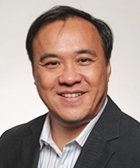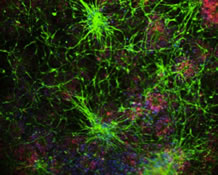Columbia University
Irving Medical Center
Neurological Institute
710 West 168th Street, 3rd floor
(212) 305-1818
Featured Research
In the Lab:
Wai Haung Yu, PhD
 Wai Haung Yu, PhD
Wai Haung Yu, PhDMy lab focuses on the role of autophagic-lysosomal (A-L) clearance of proteinopathies using models of tauopathy, for Alzheimer's disease (AD) and Parkinson’s disease (PD), specifically. During my postdoc with Dr. Randy Nixon (Nathan Kline Institute/NYU), we pioneered much of the work on autophagic function and dysfunction in AD and this understanding has formed the foundation of the work in my lab, where we identify the cellular consequences of failed autophagic-lysosomal function, including increased proteinopathy, lipid imbalances, and exosomal burden in brain regions susceptible to A-L stress. An example of this work is the investigation of glucocerebrosidase (GBA) mutations that are associated with greater risk of PD. This lysosomal resident enzyme is responsible for the breakdown of glucocerebrosides. With a loss of enzyme function, there is also an A-L deficit that leads to increased and accelerated pathology in the midbrain, including increased incidence of cognitive deficits associated with proteinopathy in the hippocampus and cortex. For these studies, we have relied on multiple cell systems, including tau/GBA/synuclein mouse models in collaboration with Dr. Karen Duff and others, biosamples from the New York Brain Bank (and biobanks around the world), and iPSC models from both Dr. Li (GBA-PD) at New York Stem Cell Foundation and Dr. Andrew Sproul (AD) at the Taub Institute.
 Figure 1.
Figure 1. To counter these A-L disturbances, our lab is also focused on the translational opportunities to treat autophagic-lysosomal stress in aging and neurodegeneration. Armed with our knowledge of the multi-faceted autophagic flux pathway (Fig. 1), we can interrogate the best opportunities for different treatment regimens, including targeting induction of autophagy, transport, fusion of vesicular compartments or enhancing lysosomal capacity. We are also exploring if we can identify biomarkers of A-L stress in biofluids from AD and PD patients (in collaboration with Dr. Roy Alcalay at Columbia and Dr. Paul Schulz at University of Texas Health Sciences Center). Central to our lab's focus is developing small molecules and identifying drugs that can be used to address deficits in protein quality control, from assay development to small molecule development (in collaboration with Dr. Donald Landry at Columbia and Juan Marugan at the NIH). One series has been recently licensed by a new biotech company and is the primary focus of their business development plan.
I am currently supported by the NIH, CurePSP, and have a pilot project with the Alzheimer's Disease Research Center at Columbia. Previous support includes NIH, Alzheimer's Association, Brightfocus/AHAF, ADDF, AFTD, CurePSP, Merck and Weston Brain Institute. To date, I have co-authored 36 papers with over 6500 citations. In addition to research at Columbia, I serve as Associate Editor for Frontiers in Neuroscience (Neurodegeneration), Advisor for the Weston Brain Institute and SRB for ADDF. I also advise for Society for Women's Health Research and sit on the Government and Public Affairs Committee at the Society for Neuroscience. This Committee's mission is to work with public officials to identify the importance of research on health and society, and advocate on behalf of scientists for neuroscience research support. This will also involve coordinating tri-state efforts for Capitol Hill day visits and continued engagement with our elected officials, including a recent visit by NY State Senator Krueger to the Taub Institute. Finally, I continue to support the activities of braiNY, the Greater New York City SfN chapter, which formed in 2003 (cofounded with Dr. Duff) and was the 2013 Chapter of the Year winner.
Wai Haung Yu, PhD
Assistant Professor of Pathology and Cell Biology (in the Taub Institute for Research on Alzheimer's Disease and the Aging Brain) at the Columbia University Medical Center
why2102@columbia.edu

